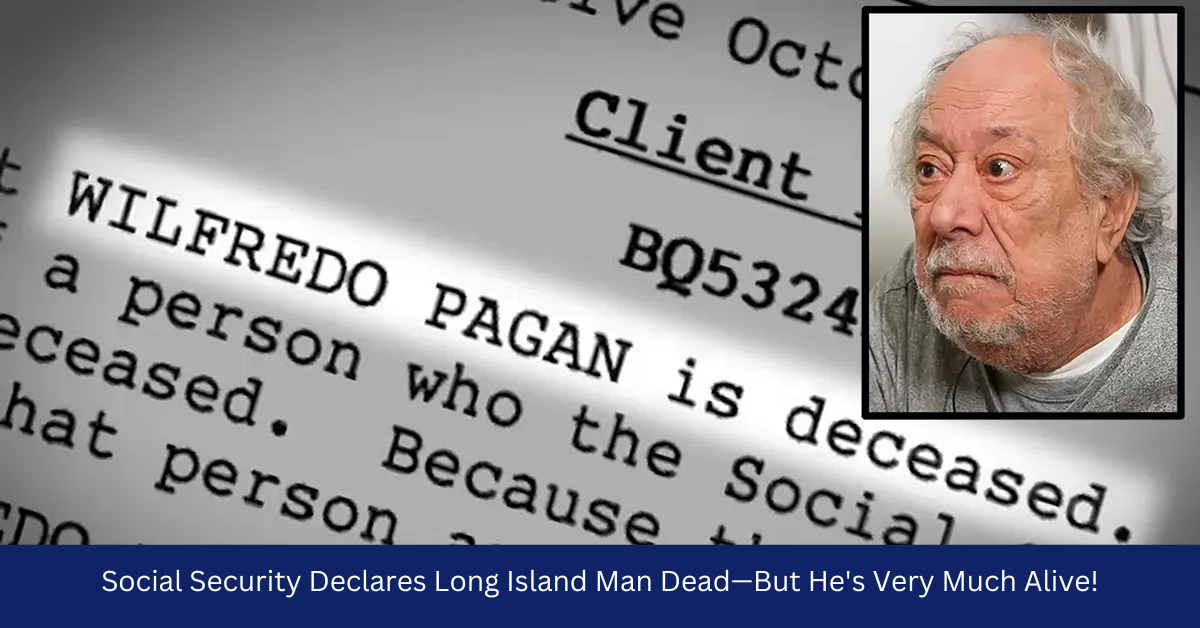A Long Island man was stunned when the Social Security Administration (SSA) informed him that he was legally dead, resulting in a complete termination of his benefits. Despite repeated attempts to prove that he is very much alive, the issue remains unresolved, leaving him without financial assistance and scrambling for a solution.
John Reynolds, 62, a retired construction worker from Suffolk County, discovered the error when he visited his local bank to withdraw funds from his Social Security benefits account. Instead of his usual deposit, he found a negative balance. Concerned, Reynolds contacted the SSA, only to be told that, according to their records, he was deceased.
“I thought it was a joke at first,” Reynolds said. “How could I be dead if I’m talking to them on the phone?”
But the situation was far from humorous. Reynolds was informed that since he was officially classified as deceased, his Social Security payments had been halted, his Medicare benefits were voided, and his financial accounts were flagged. He was effectively erased from the system.
According to the SSA, such errors occur when a person’s Social Security Number (SSN) is mistakenly added to the agency’s Death Master File (DMF)—a database used to prevent fraud by tracking deceased individuals. The agency processes more than 6.5 million death reports annually, and while the error rate is low, mistakes like Reynolds’ case still occur.
“Once you’re in the Death Master File, it’s incredibly difficult to prove you’re alive,” said David Johnson, a former SSA claims representative. “It’s a bureaucratic nightmare.”
Fighting to Prove He’s Alive
Reynolds immediately gathered his documents, including his birth certificate, passport, and driver’s license, and visited his local SSA office. However, reversing the error is not simple.
“They said I had to provide multiple forms of identification and even get a letter from my bank confirming my recent activity,” Reynolds explained. “Then they told me it would take weeks, maybe even months, to process.”
In the meantime, he was left without financial support. His bank froze his accounts due to the SSA classification, meaning he couldn’t pay his rent or cover medical expenses.
Mistaken deaths are more common than many realize. According to a 2021 report by the SSA Office of the Inspector General, around 12,000 living Americans are mistakenly declared dead each year. The consequences can be devastating—leading to loss of benefits, frozen bank accounts, and even denied medical care.
A Slow and Frustrating Process
Reynolds has filed multiple appeals with the SSA, but the agency insists that fixing the issue requires processing through multiple government databases, a step that takes time.
The SSA provides a formal process for those incorrectly listed as deceased, requiring affected individuals to visit their local office with proof of identity. The agency recommends bringing multiple forms of a valid ID and speaking directly to an agent. More information on how to correct SSA errors can be found on the official SSA website: ssa.gov.
While Reynolds awaits a resolution, he has had to rely on friends and family to cover his basic expenses. He also contacted his local congressional representative, hoping political pressure might expedite the correction.
“I’m a simple guy—I worked hard my whole life, and now I have to fight just to prove I exist,” he said. “It’s humiliating.”
Government Response and Accountability
The SSA has acknowledged that errors like this happen but maintains that the agency processes corrections as quickly as possible. However, for individuals like Reynolds, even a few weeks without income can be financially devastating.
Experts suggest that those affected by SSA errors should act quickly, document everything, and escalate their cases to higher authorities if necessary. In some instances, hiring a lawyer specializing in Social Security issues can help speed up the process.
Individuals who face similar issues can also seek assistance from the National Council on Aging (NCOA) or contact their local Legal Aid Society for guidance.
As Reynolds continues his battle to reclaim his identity and benefits, his situation serves as a stark reminder of the importance of government efficiency—and the real-world consequences of bureaucratic mistakes.
Disclaimer: This article has been meticulously fact-checked by our team to ensure accuracy and uphold transparency. We strive to deliver trustworthy and dependable content to our readers.








